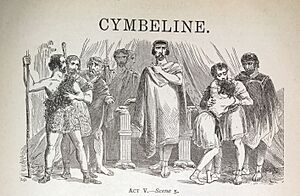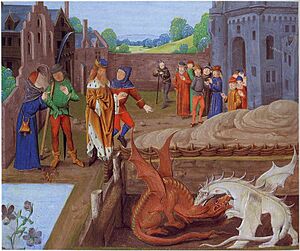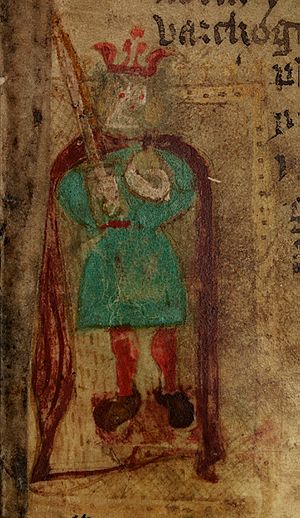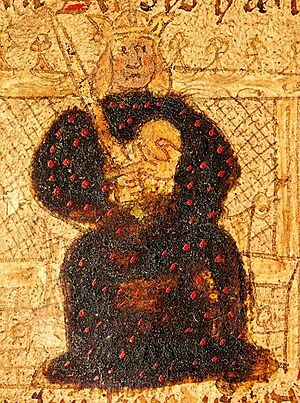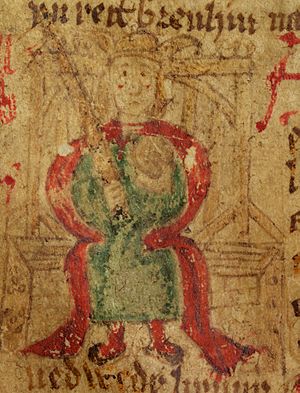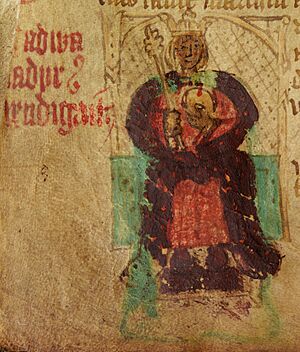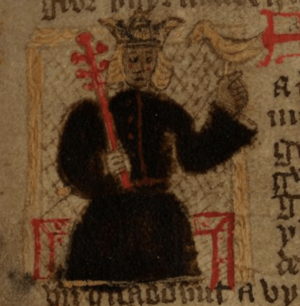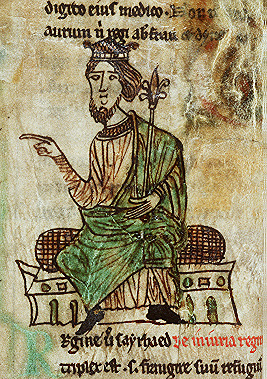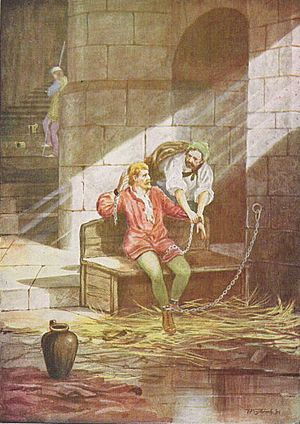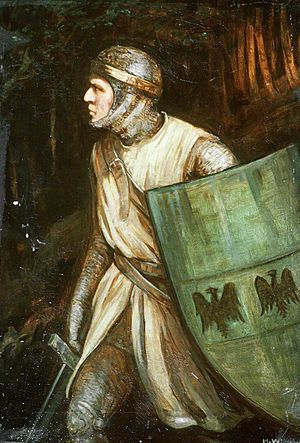King of the Britons facts for kids
The title King of the Britons (in Welsh: Brenin y Brythoniaid, in Latin: Rex Britannorum) was used a long time ago to describe the most powerful leader among the Celtic Britons. This was before and after the Romans ruled Britain, all the way up until the Normans arrived in Wales and England.
The Britons were people who spoke a language called Brittonic. This language is the ancestor of modern Welsh. These people lived in what is now Wales, England, and southern Scotland. Today, the Welsh, Cornish, and Bretons are descendants of these ancient Britons.
Later, during the time of the Normans and Plantagenets, only Wales (or parts of it) was still ruled by Brittonic leaders. So, the word "Britons" started to mean the Welsh people (who call themselves Cymry in Welsh). As the Welsh rulers became less powerful compared to the Kings of England, their titles changed. In the 11th century, they were called "King of the Britons." By the 13th century, this title had changed to "Prince of Wales."
Contents
Early Kings of the Britons
Before the Romans came, some powerful leaders were known as Kings of the Britons. These kings often ruled over different tribes.
- Cassivellaunus (Welsh: Caswallawn fab Beli)
* He was a British war leader who fought against Julius Caesar when the Romans invaded in 54 BC.
- Cunobeline (Welsh: Cynfelyn)
*
* He ruled from about 9 AD to 40 AD. His lands were in what is now southeastern England. Some old writings call him "King of the Britons."
* He ruled from about 40 AD to 43 AD. His power base was in the south of Britain. An old stone inscription calls him "Great King of the Britons."
Kings After Roman Rule
After the Romans left Britain around 410 AD, there was no single ruler for a while. Different British leaders rose to power.
- Vortigern (Welsh: Gwrtheyrn)
*
* He was a powerful figure in the mid-5th century. He is sometimes called "King of the Britons" in old texts.
- Ambrosius Aurelianus (Welsh: Emrys Wledig)
*
* He was a leader in the late 5th century, known for fighting against the Anglo-Saxons who were invading Britain.
*
* He was a king of Gwynedd (in North Wales) around the mid-6th century. He was described as a king who "reigned among the Britons."
*
* He was a powerful king of Gwynedd who died in 634. He fought against the Anglo-Saxons and was called "King of the Britons."
*
* He was another king of Gwynedd from around 654 to 664. He was also described as a king who "reigned among the Britons."
Kings of Wales and Princes of Wales
Over time, the title "King of the Britons" slowly changed as the Welsh rulers became more focused on Wales itself. Eventually, the title "Prince of Wales" became common.
- Rhodri the Great (Welsh: Rhodri Fawr)
*
* He ruled from 844 to 878 and united much of Wales under his rule. He was called "King of the Britons" and is considered one of the most important early Welsh rulers.
*
* He ruled from 942 to 950 and was known for creating a set of laws for Wales. He was called "King of the Britons" and "King of all Wales."
* He ruled from 1039 to 1063 and was the only Welsh king to rule all of Wales. He was called "King of the Britons" and "King of Wales."
*
* He ruled Gwynedd from 1136 to 1137 and was called "King of all the Welsh."
*
* He ruled Gwynedd from 1137 to 1170. He was called "Prince over the British nation," "King of Wales," and "Prince of the Welsh." This shows the shift in titles.
See also
 | Chris Smalls |
 | Fred Hampton |
 | Ralph Abernathy |


